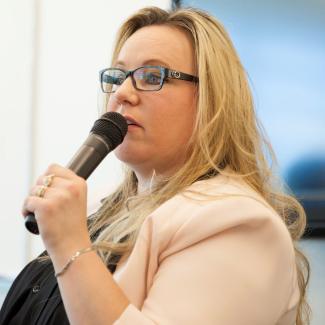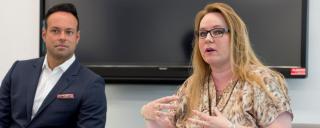Dr. Taylor Contributes Years of Valuable Banking and Agribusiness Experience to the MFRE
Dr. Karen Taylor is a director of Corporate Finance at BMO Financial Group. She teaches Agribusiness Management at the UBC Master of Food and Resource Economics (MFRE) and holds a Ph.D. in Agriculture Economics. We sat with her and discussed her background and how her experience brings considerable industry value to the MFRE program.
Why did you decide to pursue a career in the Agri-Food Sector?
I come from an agricultural food production background. My family farmed, and we didn’t have off-farm income when I was growing up. Everyone in my family historically farmed and that’s why I studied agricultural economics and Business. Being an achievement-oriented person, I did my MBA in agribusiness at the University of Guelph after my undergraduate degree and a Ph.D. in Agriculture Economics. I found it interesting to be in a sector that is constantly changing and the sector that matters. Agriculture is the oldest and the most important profession. Not just food production. People working in agriculture are a steward of the land, which goes to sustainability and sustainable agriculture. I like the environmental aspect of the agriculture sector, and most of all, I like the people.
Please tell us about your professional journey in the banking sector
After my Ph.D., I started working for Farm Credit as a senior account manager. As you advance through your career, you develop more skills, more connections within the industry, and a reputation. That led me to a corporate finance job at BMO, where I primarily deal with large complex files that require significant lending for large agricultural operations. I enjoy dealing with clients; it helps me understand business trends and continuously identify opportunities to develop new and valuable opportunities to acquire new clients. I enjoy the Industry, the people, the dynamics of the sector, and how it’s constantly changing. I feel like it is rewarding in a way because agriculture is so important in life

Tell us more about the course you teach in the Master of Food and Resource Economics Program (MFRE)
I teach Agribusiness Management in the MFRE Program. This course tries to give students a glimpse and some real-world experience into the agribusiness sector. That is why part of the course includes site visits so that the students can see the agricultural enterprises and hear from the owners and managers. I leverage my connections within the industry and open the doors for allowing the students into their operations. With that, we can discuss practical examples and case studies in the class. The course focuses on four pillars: Financial Analysis, Valuation, Source and Use of Capital, and Production management along with sustainable leadership.
In particular, Financial Analysis, Valuation, and Source & Use of Capital give the students insight into how Agribusiness is one of the most essential businesses, and it is capital intensive because of land, building & equipment, and in some cases quotas that require significant amounts of capital. The course opens students’ eyes to the reality of agribusiness and, hopefully, enacts a little passion in them.
It is good for students to see that there are well-paying long-term career jobs in the field of Agriculture and Ag Financing. With my experience, I can open their eyes to the opportunities that are before them in the Agriculture sector. Additionally, I teach students about perspectives; there is how things are done in the textbook and how they are done in the real world. For example, if you are an investor, you will be interested in Return on Equity (ROE) and benchmarking with peers to ensure you are getting a return on your investment. If you are Banker, you will be more interested in cash flow, Debt Service ratio, Gross margin, EBITDA, working capital, and collateral. Then I ask the students - if you are a business owner, what are the things you look at? I give the students various methods and perspectives on how an Investor, Banker, and Business Owner will look at the financial analysis tools. Ultimately provide them with an indication of how to use the numbers to get insight into the Business and into the sector.
What are the unique qualities you think that MFRE students have?
The MFRE program has done a really great job of teaching the students a broad spectrum of essential pillars. These pillars are centered around Policy, Agribusiness and Ag financing, and Data Analysis. That means that the students that come out of the program have all these skills and it makes them very marketable in the industry because they can work for the government in a policy Job, they can work for a Bank in a finance job and they can work as Business Analyst or Data Analyst in a Corporation. In addition, being a competitive program, the students that come out of the programs are the best and brightest. A certain amount of reputation is built because the MFRE Program has done an excellent job of creating a program where the students are skilled in the end.
What is your favorite part of teaching MFRE students?
My favorite part of teaching in the MFRE program is the students. Their interest, passion, and intellect is mind-blowing. They ask good questions that show they are really interested in the subject. Because they ask questions, it keeps me operating at a high level. I also love the diversity of the MFRE students, it brings so much richness to the program.
